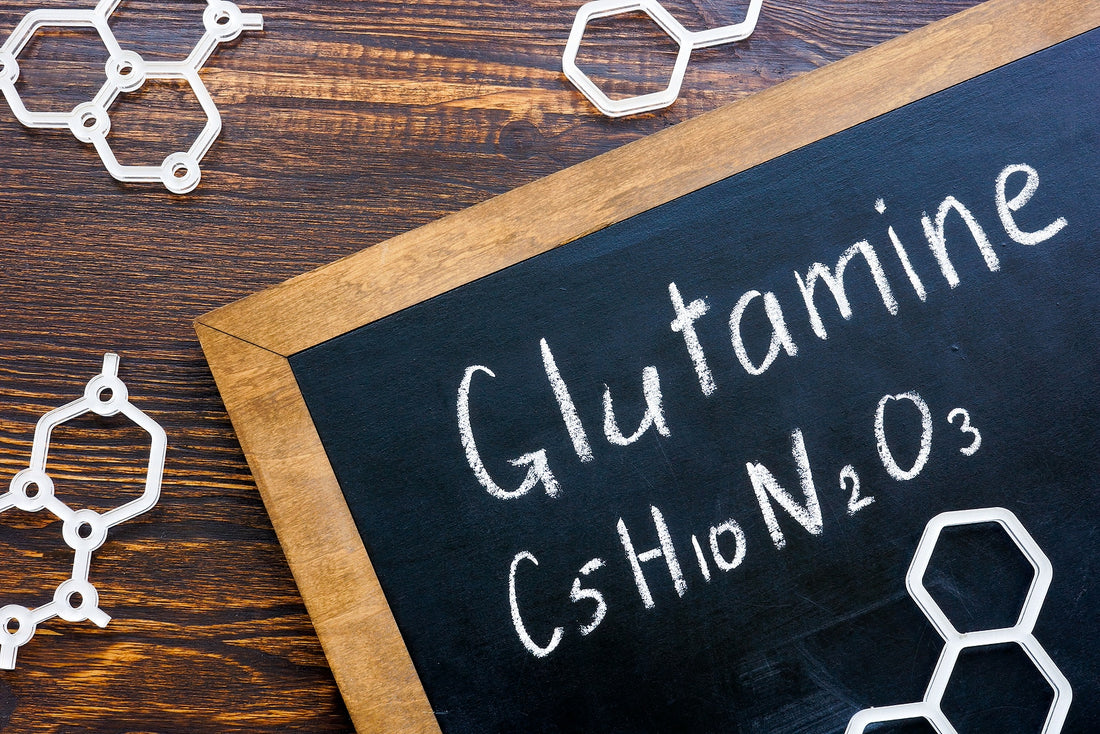Got gut health?
If not, you may be on the quest to find products that can help you at this stage in your gut healing journey.
But, as you've probably discovered, there are so many different components of gut health – probiotics, prebiotics, probiotics. Collagen, bone broth, amino acids, and so on.
One of those amino acids is something called Glutamine. How is this helpful to you, and what should you know about it?
Get ready, because in this article we’ll cover all the ins and outs of glutamine for gut health.
Role of Glutamine
Every protein in your body is built from a combination of 20 different amino acids. Some of these your body makes naturally, and others you need to get from outside food sources (1).
L-glutamine is actually one of the most abundant amino acids in your body, created in your muscles, liver and gut. These areas determine how much is released into your body, but certain factors can influence how much (or how little) is produced (2).
Fun fact: this amino acid also has another form, D-glutamine. They differ a little bit in their chemical makeup (4), and L-glutamine is the only form found in supplements and foods is L-glutamine.
Food Sources of Glutamine
While you can buy glutamine supplements in just about every health store these days, where can you find natural sources of glutamine?
There are certain foods (5) that contain a percentage of this protein naturally, including:
- Corn
- White rice
- Tofu
- Milk, skim
- Beef
- Eggs
Getting a good variety can be a great way to get glutamine, but sometimes food isn’t enough. If you’re trying to eat well and still struggle with digestion, supplementing might be the next best step.
Benefits of Glutamine for Gut Health
Imagine a dam made from large stones, keeping back a lake on the other side. It’s an old wall, and you can see areas where the mortar holding the stones together is beginning to flake and fall out. Over time, this allows water to seep through, and if left unchecked the contents in the water can flood over onto the other side, causing damage.
The tissue in your gut lining take on a similar role. If you were to look under a microscope, you would see cells of all shapes and sizes working together. Glutamine acts like the mortar between the stones. It keeps your cells junctions tight, preventing substances from leaking from your digestive tract into your bloodstream (10). This is important if you suffer from digestive issues like leaky gut or IBS.
Glutamine also has antioxidant properties that can helps influence your inflammatory response (3), which can be tied to how well your neurotransmitters work. And why does this matter? Because neurotransmitters are your internal communication messengers.
Research on the gut-brain axis continues to reveal insight on when chemical messages become disrupted, poor digestion, brain fog, and mood disorders can develop (7).
Additional Benefits
Not only does glutamine help improve your gut wall structures, it’s also been shown to:
-
Improve brain function: Chronic inflammation can contribute to numerous cognitive functions. Due to its anti-inflammatory properties, glutamine may be able to lessen the severity and improve brain function overall (9).buy filitra online buy filitra online cheap pharmacy
- Support a healthy immune system: Certain intestinal cells and white blood cells use glutamine as a fuel source (7), which helps you maintain a strong and active immune response.
- Help treat ulcers: Harmful bacteria called Helicobacter pylori can cause painful stomach ulcers, but studies find that l-glutamine has antioxidant properties that can help treat ulcers and promote healing (8).
- Speed up healing and recovery time: Research shows increasing amounts of glutamine in the diet helped abdominal surgery patients recover faster (6).
What Are the Negative Effects of Glutamine?
Good news! Because both d-glutamine and l-glutamine are produced naturally in the body, there's little concern about harmful side effects if you happen to take in too much.
That said, if you decide you’d like to take glutamine supplements, always check the ingredients. The FDA does not regulate the production and administration of supplements (12), so there's always a chance there are ingredients that aren't good for you.
Dosage
The average diet will give you between 3-6 grams of glutamine per day (13), but if your goal is to heal your gut, you may need to supplement more for the time being.
If that's the case for you, how much is too much? Everyone is different, but some data suggests anywhere from 5-45 grams per day is within a safe range (14). Talk with a nutritionist to find a plan that will best suit your unique circumstance.
Conclusion
Gut health covers a lot of aspects. There’s inflammation, immune system, gut lining strength, leaky gut, and more.
Depending on where you’re at in your gut health journey, you may be curious about what glutamine has to offer. This protein is one of the most abundant in the body, and can be consumed in different food sources as well.
L-glutamine offers power anti-inflammatory properties that can help soothe and heal your digestive tract, enhance your brain’s abilities, treat ulcers, and strengthen you immune system.
When looking for supplements, check to make sure they’re third-party certified, have good customer reviews, and offer a satisfaction guarantee.
Know someone who might benefit from more glutamine? Share these insights with them today!
References
1. https://my.clevelandclinic.org/health/articles/22243-amino-acids
2. https://www.ncbi.nlm.nih.gov/pmc/articles/PMC6266414/
3. https://www.ncbi.nlm.nih.gov/pmc/articles/PMC6912001/
4. https://pubmed.ncbi.nlm.nih.gov/18642934/
5. https://www.healthline.com/nutrition/glutamine#TOC_TITLE_HDR_3
6. https://pubmed.ncbi.nlm.nih.gov/19382426/
7. https://www.ncbi.nlm.nih.gov/pmc/articles/PMC6469458/
8. https://innovareacademics.in/journals/index.php/ajpcr/article/download/18704/12572
9. https://www.ncbi.nlm.nih.gov/pmc/articles/PMC7760805/
10. https://www.ncbi.nlm.nih.gov/pmc/articles/PMC4369670/
11. https://www.sciencedirect.com/science/article/pii/S2213453021000112
12. https://www.fda.gov/consumers/consumer-updates/fda-101-dietary-supplements
13. https://academic.oup.com/jn/article/138/10/2045S/4670120
14. https://pubmed.ncbi.nlm.nih.gov/11822473/
✝✝This noted statement is based on independent research and is not necessarily the opinion of the author
